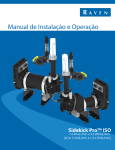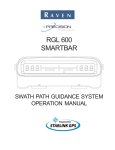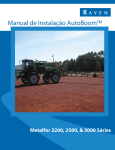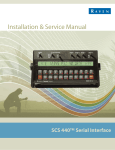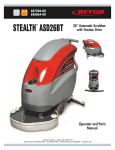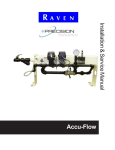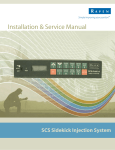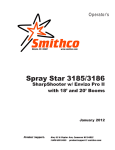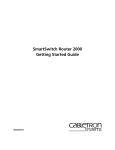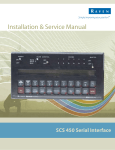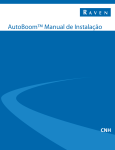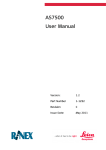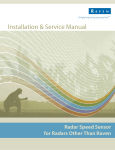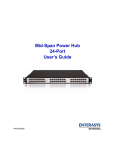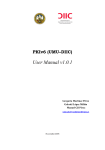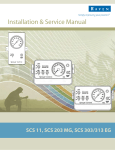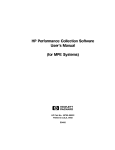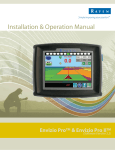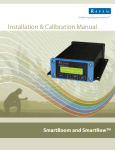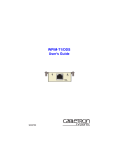Download Installation & Operation Manual
Transcript
Installation & Operation Manual AccuFlow™ and AccuFlow HP™ AccuFlow HP Patent Pending Disclaimer While every effort has been made to ensure the accuracy of this document, Raven Industries assumes no responsibility for omissions and errors. Nor is any liability assumed for damages resulting from the use of information contained herein. Raven Industries shall not be responsible or liable for incidental or consequential damages or a loss of anticipated benefits or profits, work stoppage or loss, or impairment of data arising out of the use, or inability to use, this system or any of its components. Raven Industries shall not be held responsible for any modifications or repairs made outside our facilities, nor damages resulting from inadequate maintenance of this system. As with all wireless and satellite signals, several factors may affect the availability and accuracy of wireless and satellite navigation and correction services (e.g. GPS, GNSS, SBAS, etc.). Therefore, Raven Industries cannot guarantee the accuracy, integrity, continuity, or availability of these services and cannot guarantee the ability to use Raven systems, or products used as components of systems, which rely upon the reception of these signals or availability of these services. Raven Industries accepts no responsibility for the use of any of these signals or services for other than the stated purpose. ©Raven Industries, Inc. 2011, 2012 Table of Contents Chapter 1 Important Safety Information................................................. 1 Additional Safety Information .................................................................................................... 3 Electrical Safety ................................................................................................................... 3 Discharging the AccuFlow™ System ........................................................................................ 4 Chapter 2 Introduction............................................................................. 5 Overview ................................................................................................................................... 5 Standard AccuFlow ............................................................................................................. 5 AccuFlow HP ....................................................................................................................... 5 Standard AccuFlow™ Kit Contents ........................................................................................... 6 AccuFlow HP™ Kit Contents ..................................................................................................... 8 Updates ..................................................................................................................................... 9 Chapter 3 Standard AccuFlow™ Installation....................................... 11 Assembling the AccuFlow™ System ....................................................................................... 12 AccuFlow™ Kit Assembly ................................................................................................. 13 Mounting the AccuFlow™ System .................................................................................... 15 Emergency Shut-off Rope Installation ............................................................................... 16 Vapor and Applicator Line Installation ..................................................................................... 17 Mounting the Manifold ....................................................................................................... 20 AccuFlow™ Multi-Section Control ..................................................................................... 21 Dual Cooler Installation ........................................................................................................... 22 Checking for System Leaks .................................................................................................... 23 Chapter 4 Standard AccuFlow™ Calibration and Operation ............. 25 Programming NH3 Rate Control ............................................................................................. 25 Adjusting the Boom Cal ..................................................................................................... 25 Adjusting the Speed Cal .................................................................................................... 25 Adjusting the Meter Cal ..................................................................................................... 26 Adjusting the Rate Cal ....................................................................................................... 26 Adjusting the Valve Cal ..................................................................................................... 27 Charging the AccuFlow™ System .......................................................................................... 28 Verifying AccuFlow™ Operation ............................................................................................. 29 Chapter 5 AccuFlow HP™ Installation ................................................. 31 Mounting the AccuFlow HP™ System .................................................................................... 32 Emergency Shut-off Rope Installation ............................................................................... 35 AccuFlow HP™ Vapor and Applicator Line Installation ........................................................... 36 Mounting the Manifold ....................................................................................................... 40 AccuFlow™ Multi-Section Control ..................................................................................... 41 Boost Pump Hydraulic Connections ........................................................................................ 42 Manual No. 016-0171-496 Rev. C i Table of Contents Checking for System Leaks Chapter 6 ..................................................................................................... 42 AccuFlow HP™ Calibration and Operation........................ 43 Programming NH3 Rate Control ............................................................................................. 44 Adjusting the Boom Cal ..................................................................................................... 44 Adjusting the Speed Cal .................................................................................................... 44 Adjusting the Meter Cal ..................................................................................................... 44 Adjusting the Valve Cal ...................................................................................................... 45 Adjusting the Rate Cal ....................................................................................................... 45 Programming Boost Pump Control .......................................................................................... 45 Charging the AccuFlow™ System and Calibrating the Pressure Transducer ......................... 46 Verifying AccuFlow HP™ Operation ........................................................................................ 47 Chapter 7 Service and Maintenance..................................................... 49 Discharging the AccuFlow™ System ...................................................................................... 50 Servicing and Storing the AccuFlow™ System ....................................................................... 51 Opening the Super Cooler ................................................................................................. 51 Strainer Maintenance Procedure ............................................................................................. 54 Relief Valve Replacement Procedure ...................................................................................... 55 Flow Meter Maintenance and Adjustment ............................................................................... 55 Chapter 8 Troubleshooting ................................................................... 57 Chapter 9 System Diagrams ................................................................. 65 Standard AccuFlow™ Diagrams ............................................................................................. 65 AccuFlow HP™ Diagrams ....................................................................................................... 74 Chapter 10 Testing Speed and Flow Meter Extension Cables ............. 79 Speed Sensor Extension Cable ............................................................................................... 79 Testing the Speed Sensor Extension Cable ...................................................................... 79 Flow Meter Extension Cable ................................................................................................... 80 Testing the Flow Meter Cable ............................................................................................ 80 ii AccuFlow™ and AccuFlow HP™ Installation & Operation Manual CHAPTER 1 Important Safety Information Chapter1 NOTICE • Read this manual carefully before installing the AccuFlow™ system. • Review procedures for safe handling and use of anhydrous ammonia (NH3) with a local NH3 supplier. If you are not trained to handle anhydrous ammonia, contact a local NH3 supplier or the appropriate agricultural department for information on training. • Please review the operation and safety instructions included with the implement and/or controller. • Follow safety information presented within this manual and review operation of the AccuFlow system with a local anhydrous ammonia (NH3) supplier. • Follow all safety labels affixed to the AccuFlow system components. Be sure to keep safety labels in good condition and replace any missing or damaged labels. To obtain replacements for missing or damaged safety labels, contact a local Raven dealer. • Do not attempt to modify or lengthen any of the system control cables. Extension cables are available from a local Raven dealer. • If you require assistance with any portion of the installation or service of Raven equipment, contact a local Raven dealer for support. DANGER 1. Anhydrous Ammonia (NH3) Under Pressure. Anhydrous ammonia can cause severe burning, blindness, or death. Carefully read and follow all safety instructions and warnings before operating or servicing equipment. 2. Always wear proper personal protective equipment when working with the AccuFlow system and anhydrous ammonia. Appropriate protective clothing includes, but is not limited to: • Goggles or face shield • Protective suit and gloves • Respirator 3. DO NOT allow any one to operate the AccuFlow system without proper instruction and training. Manual No. 016-0171-496 Rev. C 1 Chapter 1 FIGURE 1. Danger Warning Decal Affixed to AccuFlow Super Cooler (P/N 039-0159-034) CAUTION 1. 2. 3. Use caution when handling anhydrous ammonia (NH3) products. a. Stand ‘up wind’ when working around anhydrous ammonia (NH3) and related equipment. Always keep anhydrous ammonia equipment away from buildings, livestock, and other people. b. Anhydrous ammonia may cause sickness or death. Never work on NH3 equipment in confined spaces. Seek immediate medical attention if symptoms of illness occur during, or shortly after, use of anhydrous ammonia products. c. Keep a source of clean water (at least five gallons) readily available while working with anhydrous ammonia. In case of exposure, flush exposed skin or eyes immediately with large quantities of water and seek immediate medical attention. d. NH3 can be harmful to the environment if not used properly. Follow all local, state, and federal regulations regarding proper handling of anhydrous ammonia. Always remove the AccuFlow™ system from service before performing maintenance. a. Thoroughly bleed all system lines and disconnect nurse tank hose before beginning service or maintenance. b. Allow a minimum of one (1) hour to fully discharge the system. Verify gauge pressure is at zero before opening the system. Use extreme caution when opening a previously pressurized system. Before performing service or maintenance on the AccuFlow system, read and follow the instructions provided in the Discharging the AccuFlow™ System section on page 4 or page 50 to properly discharge the super cooler and application lines. 2 AccuFlow™ and AccuFlow HP™ Installation & Operation Manual Important Safety Information Caution Decal Affixed to AccuFlow Super Cooler (P/N 039-0159-035) 1 FIGURE 2. Additional Safety Information Electrical Safety CAUTION Do not reverse power leads. Doing so could cause severe damage to the equipment. Always make sure that the power leads are connected to the correct polarity as marked. Ensure that the power cable is the last cable to be connected. Manual No. 016-0171-496 Rev. C 3 Chapter 1 Discharging the AccuFlow™ System The AccuFlow system must be discharged of all anhydrous ammonia and the system must be completely shut down before the implement can be transported. DANGER DO NOT transport the AccuFlow system while it is charged with anhydrous ammonia. The AccuFlow super cooler and product lines must be completely discharged before transporting the implement. The following procedure outlines the proper method for discharging NH3 from the AccuFlow system and preparing the system for transport, service, or maintenance. DANGER Use extreme caution when opening a previously pressurized system. Exposure to anhydrous ammonia can cause severe burning, blindness, or death. To avoid injury or death, always wear proper personal protective equipment. Note: Personal protective equipment such as a respirator, protective suit and gloves are required when working with anhydrous ammonia products. Before transporting the AccuFlow™ system or beginning service or maintenance: 1. Toggle the console or vehicle master switch to the off position. 2. Completely close the main shut-off valve on the supply or nurse tank. 3. (AccuFlow HP™ only) Turn off boost pump control by turning the respective product off and closing the tractor SCV (selective control valve). Note: Never run the pump without product in the application lines as damage to the pump seals will result. 4. Resume field application until the pressure gauge reads no remaining pressure is in the AccuFlow system. 5. Verify that the console and/or vehicle master switch, and all section switches, are in the off position. 6. Completely close the emergency shut-off valve on the AccuFlow super cooler. 7. Bleed and disconnect the nurse tank supply hose from the AccuFlow system. 8. Toggle the console master and all section switches to the on position. 9. While standing upwind from the implement, slowly open bleed valve(s) until fully open. Refer to Figure 1 on page 12 for assistance locating AccuFlow bleed valve(s). 10. Allow a minimum of one (1) hour to fully discharge the system. Verify that the pressure gauge on the AccuFlow manifold reads zero and the super cooler is not cold to the touch before opening the system. This ensures that all liquid NH3 has evaporated and pressure has been discharged. 4 AccuFlow™ and AccuFlow HP™ Installation & Operation Manual CHAPTER Introduction Chapter2 2 Overview The Raven AccuFlow™ systems are designed to provide continuous and automatic control of anhydrous ammonia (NH3) applications via a Raven serial or CAN control system. The rate of application is monitored via a flow meter and controlled by the Raven console and control valve(s). The operator sets the target application rate in the Raven control console and the system automatically adjusts for vehicle speed and section status changes. Note: To properly measure and control application, anhydrous ammonia must be in a liquid state when it passes through the flow meter. To remain liquid, anhydrous ammonia must be stored at a temperature of -28° F [-33° C] or kept under pressure at higher temperatures. To help ensure that the ammonia is in a liquid state as it passes through the flow meter the AccuFlow super cooler uses a small amount of anhydrous ammonia from the nurse tank to reduce the temperature of the ammonia being applied. The Raven AccuFlow system is available in two configurations to match the NH3 application needs: • Standard AccuFlow™ • High Performance (HP) AccuFlow™ Standard AccuFlow The standard AccuFlow system is available in one or two valve configurations with single or dual coolers. The standard AccuFlow system is capable of applying anhydrous ammonia at rates up to 30 gallons per minute [113 liters per minute] with a single cooler system, or 45 gallons per minute [170 liters per minute] with a dual cooler system. Note: System capacity will vary based upon ambient conditions. Contact a local Raven dealer for more information. AccuFlow HP The AccuFlow HP system uses a boost pump to increase the pressure of the anhydrous ammonia in the application lines which allows the HP system to apply anhydrous ammonia in colder ambient temperatures and increased speeds. The AccuFlow HP system is also available in one or two valve configurations with dual coolers. Manual No. 016-0171-496 Rev. C 5 Chapter 2 Standard AccuFlow™ Kit Contents Please review the following tables for components, parts, and fittings which should have been supplied with the Raven AccuFlow system. It may be necessary to order some components of the AccuFlow system separately. Before beginning assembly and installation, verify that all required components have been purchased. Single Cooler Kits AccuFlow Systems and Kits Components AccuFlow Super Cooler Fittings for Assembly Fittings for Assembly, Dual Cooler Flow Meter, RFM 60S Valve, 1-1/4” NPT Control Valve, 1-1/4” NPT On/Off Valve, 1-1/4” NPT Fast Valve Note: P/N 063-0173-314 117-0171-385 Dual Cooler Systems Two Valve Kit Fast Valve Kit Two Valve Kit Fast Valve Kit 117-0171-384 1 1 117-0171-386 1 1 117-0171-387 2 1 117-0171-389 2 1 1 1 1 1 117-0171-388 063-0171-666 1 063-0173-202 1 063-0173-203 063-0173-204 1 1 1 1 1 1 AccuFlow systems will require appropriate flow cabling to connect to the Raven control console. Contact a local Raven dealer for assistance and information. To provide the most responsive control of anhydrous ammonia applications when using a multisection tool bar, a check valve assembly (P/N 063-0173-030, ordered separately) should be installed if the section on/off valves are mounted next to the distributor manifolds. Refer to the diagrams provided in Chapter 3, Standard AccuFlow™ Installation, for location. Contact a local Raven dealer for more information. See Chapter 9, System Diagrams, for detailed diagrams and system connections. 6 AccuFlow™ and AccuFlow HP™ Installation & Operation Manual Introduction Parts for Fittings and Assemblies (P/N 117-0171-385, Boxed) Qty. 1 3 2 1 2 2 1 1 2 4 4 4 4 1 1 1 2 1 2 1 2 Components • Strainer 1-1/2” Valve Assembly • U-bolt with Hardware • Bracket, Cooler Mounting • Bracket, “Z” • U-bolt, 5-1/16” x 6” x 7/16” THD • Bracket, HP Valve Mounting • Hose, 3/8” EVA • Gasket, Teflon • Bolt, 3/8”-16 x 1-1/4” • Nut, Hex • Nut, Flange Lock • Nut, 5/16” - 18 • Washer, Split Lock • Rope • Fitting, 1/4” NPT x 3/8” Hose Barb • Fitting, 1/2” NPT x 3/8” Hose Barb • Fitting, 1/2” NPT x 3/4” Hose Barb • Bushing,1-1/4” x 1” • Bushing, 1-1/4” x 1/2” Pipe • Bushing, 1-1/2” x 1-1/4” Pipe • Pipe, 1-1/4” Tee Note: P/N 063-0173-309 107-0159-447 107-0171-063 107-0171-068 107-0171-603 107-0171-931 214-0001-035 219-0000-027 311-0054-106 312-1001-037 312-1001-165 312-1001-169 313-1000-022 321-0000-359 Qty. 1 1 1 1 1 1 1 1 4 2 2 1 1 1 Components • Pipe, 1/2” x 1/2” x 1/4” Pipe • Pipe, 1/4” Cross • Pipe, 1/2” Pipe 90° Elbow • Pipe, 1-1/4” Pipe 90° Elbow • Pipe, 1-1/2” Pipe 90° Elbow • Fitting, 1-1/4” Pipe Union • Pipe, 1/4” x 2” Nipple • Pipe, 1/2” x 1-1/2” Nipple • Pipe, 1-1/4” x 3” Nipple • Pipe, 1-1/4” x 6” Nipple • Pipe, 1-1/4” x8” Nipple • Pipe, 1-1/2” x 2” Nipple • Pipe, 1-1/2” x 3” Nipple • Pipe, 1-1/2” x 12” Nipple P/N 333-0004-009 333-0004-030 333-0005-003 333-0005-006 333-0005-007 333-0006-005 333-0008-002 333-0008-015 333-0008-040 333-0008-042 333-0008-043 333-0008-047 333-0008-049 333-0008-053 333-0002-004 1 • Fitting, Pipe Plug 333-0009-082 333-0002-006 1 • Valve, 1/4” NPT Bleed 334-0001-012 333-0002-011 1 • Gauge, Pressure (0-150 PSI) 417-0001-008 333-0003-015 333-0003-017 333-0003-019 333-0004-006 1 2 2 • Gauge, Temperature (25-125° F) 417-0001-009 • Clamp, Worm Drive Hose 435-3003-002 • Clamp, Muffler 435-3003-030 2 The following plumbing components and fittings are included with each Raven AccuFlow™ system: Refer to Figure 2 on page 13 for a diagram of these fittings and parts. Parts for Dual Cooler System Fittings and Assemblies (P/N 117-0171-388) Dual cooler systems (P/N 117-0171-389 and 117-0171-387), as well as the single to dual cooler kit (P/N 117-0171-390), include the following additional fittings and components: Qty. 2 • U-bolt with Hardware 107-0159-447 1 2 1 1 2 4 4 1 • Bracket, Cooler Mounting • Hose, 3/8” EVA • Gasket, Teflon • Bolt, 3/8” x 1-1/4” • Nut, 3/8” Hex • Washer, 3/8” Split Lock • Rope • Fitting, 1/4” NPT x 3/8” Hose Barb • Fitting, 1/2” NPT x 3/8” Hose Barb 107-0171-063 214-0001-035 219-0000-156 311-0054-106 312-1001-037 313-1000-022 321-0000-359 1 1 1 1 1 3 1 Components • Fitting, 1/2” NPT x 3/4” Hose Barb • Bushing, 1-1/2” x 1-1/4” Reducing • Tee, 1/2” Pipe • Tee, 1-1/2” Pipe • Fitting, 1-1/2” Pipe 90° Elbow • Fitting, 1-1/2” Pipe Union • Pipe, 1/2” x 2” Nipple • Pipe, 1-1/2” x 2” Nipple • Pipe, 1-1/2” x 3” Nipple 333-0002-004 2 • Clamp, Worm Drive Hose 1 1 1 Note: Components • Strainer 1-1/2” Valve Assembly P/N Qty. 063-0173-309 2 P/N 333-0002-011 333-0003-019 333-0004-003 333-0004-007 333-0005-007 333-0006-006 333-0008-016 333-0008-047 333-0008-049 435-3003-002 333-0002-006 The single to dual cooler kit (P/N 117-0171-390) also includes an additional AccuFlow™ super cooler (P/N 063-0173-314). Manual No. 016-0171-496 Rev. C 7 Chapter 2 AccuFlow HP™ Kit Contents Please review the following tables for components, parts, and fittings which should have been supplied with the Raven AccuFlow HP system. It may be necessary to order some components of the AccuFlow system separately. Before beginning assembly and installation, verify that all required components have been purchased. Note: To provide the most responsive control of anhydrous ammonia applications when using a multisection tool bar, a check valve assembly (P/N 063-0173-030, ordered separately) should be installed if the section on/off valves are mounted next to the distributor manifolds. Refer to the diagrams provided in Chapter 3, Standard AccuFlow™ Installation, for location. Contact a local Raven dealer for more information. See Chapter 9, System Diagrams, for detailed diagrams and system connections. Two Valve, Dual Cooler AccuFlow HP™ Kit (P/N 117-0171-392) Qty. Components P/N 1 • Kit, AccuFlow HP Hydraulic 117-0141-002 • Assembly, Two Valve - Dual 1 063-0173-292 Cooler AccuFlow HP 2 • Hose, Anhydrous Vapor 214-0001-036 • Manual, AccuFlow Operation 1 016-0171-496 Manual 2 • Rope, 1/4” Poly Braided 321-0000-359 4 • U-bolt, 2-1/16” x 4” x 3/8” THD. 321-0000-363 8 • Nut, 3/8” Flange Lock 312-1001-164 1 • RectorSeal 222-1001-088 Fast Valve, Dual Cooler AccuFlow HP™ Kit (P/N 117-0171-393) Qty. Components P/N 1 • Kit, AccuFlow HP Hydraulic 117-0141-002 • Assembly, Fast Valve - Dual 1 063-0173-293 Cooler AccuFlow HP 2 • Hose, Anhydrous Vapor 214-0001-036 • Manual, AccuFlow Operation 1 016-0171-496 Manual 2 • Rope, 1/4” Poly Braided 321-0000-359 4 • U-bolt, 2-1/16” x 4” x 3/8” THD. 321-0000-363 8 • Nut, 3/8” Flange Lock 312-1001-164 1 • RectorSeal 222-1001-088 AccuFlow HP™ Pump Control Kit (P/N 117-0171-334) Qty. Components P/N 1 • Node, Single Product Control 063-0172-373 1 • Cable, AccuFlow HP Node 115-0171-909 8 AccuFlow™ and AccuFlow HP™ Installation & Operation Manual Introduction Updates Updates for Raven manuals as well as software updates for Raven consoles are available at the Raven Applied Technology Division web site: www.ravenhelp.com At Raven Industries, we strive to make your experience with our products as rewarding as possible. One way to improve this experience is to provide us with feedback on this manual. 2 Your feedback will help shape the future of our product documentation and the overall service we provide. We appreciate the opportunity to see ourselves as our customers see us and are eager to gather ideas on how we have been helping or how we can do better. To serve you best, please send an email with the following information to [email protected] -AccuFlow™ and AccuFlow HP™ Installation & Operation Manual -Manual No. 016-0171-496 Rev. C -Any comments or feedback (include chapter or page numbers if applicable). -Let us know how long have you been using this or other Raven products. We will not share your email or any information you provide with anyone else. Your feedback is valued and extremely important to us. Thank you for your time. Manual No. 016-0171-496 Rev. C 9 Chapter 2 10 AccuFlow™ and AccuFlow HP™ Installation & Operation Manual CHAPTER 3 Standard AccuFlow™ Installation Chapter3 The following sections are included to illustrate the proper procedure for mounting and plumbing the AccuFlow system. DANGER Anhydrous ammonia can cause severe burning, blindness, or death. Refer to the Discharging the AccuFlow™ System section on page 50 and follow the procedure for bleeding the AccuFlow system before beginning maintenance. This manual assumes that the Raven control console has already been installed and all installation and safety procedures have been completed or understood. Note: In addition to the Raven control console and associated cabling, a speed sensor and flow cabling must also be installed with the Raven AccuFlow system. Refer to Chapter 9, System Diagrams, for examples of AccuFlow systems and cable connections. Contact a local Raven dealer for more information and assistance. Manual No. 016-0171-496 Rev. C 11 Chapter 3 Assembling the AccuFlow™ System DANGER Anhydrous ammonia in vapor form can cause serious injury or death. Pipe joints must be properly sealed with RectorSeal™, or an equivalent thread sealant, to prevent leaks. FIGURE 1. Note: 12 Typical AccuFlow System (Single Section, Two Valves) AccuFlow systems with a fast control valve (P/N 063-0173-204) will only have a single control valve in place of the control valve and master on/off Valve as shown in the diagram above. AccuFlow™ and AccuFlow HP™ Installation & Operation Manual Standard AccuFlow™ Installation AccuFlow™ Kit Assembly AccuFlow System (30 GPM [113 L/min] - D/N 054-0159-330) 3 FIGURE 2. Note: The relief valve (P/N 334-0002-005) must be replaced every five years from the date of manufacture. Refer to Relief Valve Replacement Procedure section on page 55 for replacement instructions. Manual No. 016-0171-496 Rev. C 13 Chapter 3 FIGURE 3. 14 AccuFlow System (30 GPM [113 L/min - D/N 054-0159-330) Continued AccuFlow™ and AccuFlow HP™ Installation & Operation Manual Standard AccuFlow™ Installation Mounting the AccuFlow™ System Use the provided u-bolts and hardware (P/N 107-0159-447) to mount the AccuFlow system directly to the frame of the tool bar or implement. The intake port of the AccuFlow super cooler should be pointing toward the rear of implement and nurse tank. FIGURE 4. AccuFlow™ Mounting Example 3 AccuFlow Intake Port Manual No. 016-0171-496 Rev. C 15 Chapter 3 Emergency Shut-off Rope Installation Using the provided quick link (P/N 319-1000-010), securely tie a length of rope to the emergency shut-off valve. Route the rope so that, when pulled, the emergency shut-off valve closes. FIGURE 5. Using the Safety Rope Safety Rope Wind Direction WARNING Anhydrous ammonia can cause severe burning, blindness, or death. Always work upwind of an implement with the AccuFlow™ system. If the emergency shut-off rope cannot be routed to the vehicle’s cab, make sure to orient the vehicle to allow the rope to be pulled from a location upwind of the implement. 16 AccuFlow™ and AccuFlow HP™ Installation & Operation Manual Standard AccuFlow™ Installation Vapor and Applicator Line Installation DANGER Anhydrous ammonia in vapor form can cause serious injury or death. Pipe joints must be properly sealed with RectorSeal™, or an equivalent thread sealant, to prevent leaks. To complete installation of the AccuFlow system: For high flow systems (20 GPM or greater): a. Note: Use a high pressure hose rated for anhydrous use between the nurse tank and AccuFlow emergency shut-off valve. This hose should be as short as possible and must be no longer than 15 feet [4.5 m]. A 1-1/4” minimum hose size is required for the AccuFlow system. A larger hose size should be used if the application requires higher flow rates or to reduce the pressure drop between the nurse tank and AccuFlow cooler. b. Install a high flow break-away coupler to connect the nurse tank and the AccuFlow intake port. A high flow tank valve is also recommended. c. Do not use street elbows to avoid excessive pressure drop. d. Dual cooler systems should use dual tanks, dual feed lines and dual breakaways. 2. Verify that all of the applicator hoses are of equal length from each manifold hose barb to each liquid applicator tube. 3. Verify that all of the orifice openings in the liquid applicator tubes are unplugged and have the same diameter. 4. Connect the hose barb fittings to the vapor ports on the cooler in either configuration shown below. Manual No. 016-0171-496 Rev. C 17 3 1. Chapter 3 FIGURE 6. AccuFlow Cooler Vapor Tube Hose Barbs DANGER Anhydrous ammonia in vapor form can cause serious injury or death. Pipe joints must be properly sealed with RectorSeal™, or an equivalent thread sealant, to prevent leaks. 5. Weld vapor tubes provided with the kit to the back of liquid tubes as shown in Figure 1 on page 12. Vapor tubes should be spaced out evenly across the tool bar. Avoid connecting vapor tubes on adjacent rows. a. For 3/4” Vapor Tube Kits - Route 3/4” tubing from the cooler to the vapor tubes. Cut tube lengths in equal lengths and allow enough hose to avoid kinking at any folding points. Connect one end of the vapor line to the hose barb on the cooler and secure using a supplied hose clamp. Connect the other end to the vapor tubes installed on the implement and secure using the supplied hose clamps. b. For 1/2” Vapor Tube Kits - Route the 1/2” tubing from the vapor tubes to 1/2” x 3/4” x 1/2” tees as shown in Figure 8 on page 19. Cut tube in equal lengths and allow enough hose to avoid kinking at any folding points. Route 3/4” tubing from the tees to the hose barbs on the cooler. Again, cut tube in equal lengths and allow enough hose to avoid kinking at any folding points. Secure all hose connections on vapor tubes, tee fittings and cooler hose barbs with hose clamps. Note: 18 Consult a local NH3 supplier for appropriate hoses, break-away fittings, manifolds, and orifices for use with the AccuFlow system. Always install breakaway fittings in the nurse tank supply lines to reduce NH3 discharge if the nurse tank accidentally disconnects from the implement. Verify installation by referring to Figure 1 on page 12. AccuFlow™ and AccuFlow HP™ Installation & Operation Manual Standard AccuFlow™ Installation Vapor Tube Distribution Using 3/4” Vapor Tubes FIGURE 8. Vapor Tube Distribution Using 1/2” Vapor Tubes 3 FIGURE 7. Manual No. 016-0171-496 Rev. C 19 Chapter 3 Mounting the Manifold The following figure illustrates the various methods of connecting existing NH3 manifold(s) (manifold not included with AccuFlow system). When installing the manifold, Raven recommends the following: • • • • Attach a 0-60 PSI gauge in one outlet of each NH3 manifold connected to the AccuFlow system. Verify that all manifold(s) hose barbs are the same orifice diameter. Verify all hoses from the flow divider are the same length. Verify all hoses to the manifolds are the same length. FIGURE 9. Note: 20 Manifold Mounting Examples (Single Section Tool Bar) If more than two manifolds will be used with the AccuFlow™ system, a flow divider manifold will be required. Follow the manifold manufacturer instructions for proper orientation and installation. AccuFlow™ and AccuFlow HP™ Installation & Operation Manual Standard AccuFlow™ Installation AccuFlow™ Multi-Section Control Note: Adding a flow divider will decrease the pressure of anhydrous ammonia for application. Size the flow divider for minimal pressure drop to avoid reducing system capacity. Consult the manufacturer or dealer for specifications and sizing information. The following diagrams illustrate the required plumbing for a multi-section control system. Multi-Section Tool Bar with Two Valve System 3 FIGURE 10. Note: Contact a local NH3 dealer for proper orifice diameter, flow dividers, and manifold selections for the specific application. AccuFlow systems with a fast control valve (P/N 063-0173-204) will only have a single control valve in place of the control valve and master on/off Valve as shown in the diagram above. Adding a flow divider will decrease the pressure of anhydrous ammonia for application. Size the flow divider for minimal pressure drop to avoid reducing system capacity. Consult the manufacturer or dealer for specifications and sizing information. Manual No. 016-0171-496 Rev. C 21 Chapter 3 Dual Cooler Installation DANGER Anhydrous ammonia in vapor form can cause serious injury or death. Pipe joints must be properly sealed with RectorSeal™, or an equivalent thread sealant, to prevent leaks. The following diagrams are provided to assist with mounting and connecting an AccuFlow™ dual cooler system. FIGURE 11. 22 Dual Cooler AccuFlow System (D/N 016-0171-508) AccuFlow™ and AccuFlow HP™ Installation & Operation Manual Standard AccuFlow™ Installation Dual Cooler AccuFlow System Alternate Installation (D/N 016-0171-508) 3 FIGURE 12. Checking for System Leaks Once the AccuFlow™ has been installed on the implement, check the system for leaks by charging the system with compressed air and applying soapy water to all plumbing joints and hoses. Thoroughly examine plumbing connections for bubbles indicating any kind of leak. Fix any leaks before charging the AccuFlow™ system with anhydrous ammonia. Manual No. 016-0171-496 Rev. C 23 Chapter 3 24 AccuFlow™ and AccuFlow HP™ Installation & Operation Manual CHAPTER 4 Standard AccuFlow™ Calibration and Operation Chapter4 This chapter contains information on calculating or adjusting calibration values for the AccuFlow™ system. These values must be programmed on the console providing product control. Refer to the control console Installation and Operation manual for detailed programming instructions. Note: Before the AccuFlow system and connected console may be used to control anhydrous ammonia application, the following calibration values must be programmed on the Raven product control console: • • • • • Boom Cal Speed Cal Meter Cal Valve Cal Rate Cal Programming NH3 Rate Control Adjusting the Boom Cal The boom cal for the AccuFlow system can be calculated with the following formula: Number of Applicator Knives x Spacing in inches [centimeters] = Implement Width (EQ 1) For Example: If the implement has 16 knives spaced 30 inches apart, the calculated implement width is equal to 480 inches. Enter 480 as the boom cal on the control console. Adjusting the Speed Cal Calculate the speed cal according to the console’s Installation and Operation manual. No adjustments to the speed cal are required for the AccuFlow system. Manual No. 016-0171-496 Rev. C 25 Chapter 4 Adjusting the Meter Cal Locate the meter cal value printed on the tag attached to the AccuFlow™ flow meter. This value will be referred to as the “original meter cal.” The original meter cal can be adjusted to display application rates in either pounds of actual nitrogen per acre (lbs(N)/acre), or kilograms of actual nitrogen per hectare (kg(N)/ha). If the meter cal label displays an NH3 calibration value, the meter cal does not need to be adjusted. Note: All volumes will be displayed in pounds [kilograms] of actual nitrogen. To properly control the application of anhydrous ammonia, enter the target application rates as pounds [kilograms] of actual nitrogen per acre [hectare] or lbs(N)/acre [kg(N)/ha]. Use the following formulas to adjust the original meter cal for the desired display preferences: (lbs(N)/acre) Original Meter Cal / 4.22 = Adjusted Meter Cal (EQ 2) (kg(N)/ha) Original Meter Cal / [0.506] = Adjusted Meter Cal (EQ 3) Round the calculated value to the nearest 3 digit whole number and enter the value as the meter cal on the Raven console. For Example: Given an original meter cal of 720 [190]. (lbs(N)/acre) 720 / 4.22 = 170.62 (EQ 4) (kg(N)/ha) 190 / [0.506] = 375.494 (EQ 5) From the calculated values, round the adjusted meter cal value to 171 [375] and enter this value on the Raven console. Adjusting the Rate Cal Enter the target rate in actual pounds [kilograms] of nitrogen (N) per acre [hectare]. Calculating the Required Capacity To ensure that the desired application rate (in pounds [kilograms] of actual nitrogen per minute) does not exceed the AccuFlow system capacity, the required capacity of the application must be verified. Using the following formula to calculate the required capacity: Target Application Rate x Target Application Speed x Implement Width = lbs[kg](N)/min 5940[60,000] Note: 26 (EQ 6) Be sure to enter the target application rate in pounds [kilograms] of nitrogen per acre [hectare] and the implement width as calculated in the “Adjusting the Boom Cal” section on page 25. AccuFlow™ and AccuFlow HP™ Installation & Operation Manual Standard AccuFlow™ Calibration and Operation For Example: (English Units) Given a target application rate of 150 lbs(N)/acre at an average of 5.5 mph and a calculated implement width of 480 inches, the required capacity is: 150 x 5.5 x 480 = 66.6 lbs(N)/min 5940.......................... (EQ 7) (SI Units) Given a target application rate of 68 kg(N)/ha at an average of 10 km/hr and a calculated implement width of 1220 centimeters, the required capacity is: 68 x 10 x 1220 = 13.8 kg(N)/min 60,000........................ (EQ 8) The maximum capacity of the 30 GPM AccuFlow system is 126 lbs(N)/min [57 kg(N)/min]. Contact a local Raven dealer if the maximum rate is exceeded. System Capacity Chart The following figure illustrates the capacity of the AccuFlow™ system in various configurations. Refer to this chart as part of the calculation for required capacity and when troubleshooting the AccuFlow system. System Capacity Chart 4 FIGURE 1. Adjusting the Valve Cal Refer to the Raven console Installation and Operation Manual for instructions on calculating or adjusting the valve cal. Note: The valve cal may need to be adjusted to obtain desired results, particularly in applications using low flow rates. Manual No. 016-0171-496 Rev. C 27 Chapter 4 Charging the AccuFlow™ System The following procedure will step through the proper method for connecting and charging the AccuFlow system. NOTICE Carefully read all directions in this section before beginning this procedure and make sure that all steps are completed before proceeding. Review the safety requirements associated with the handling and application of anhydrous ammonia with a local NH3 supplier. 1. Verify that all hoses, fittings, and mounting bolts are securely fastened or tightened. 2. Verify that the AccuFlow flow meter is connected to the flow meter connector on the flow meter cabling. 3. Verify that the AccuFlow control valve is connected to the flow or product cable connector. 4. Verify the on/off valve(s) are connected to the on/off connectors on the flow meter cabling. 5. Toggle the master switch to the off position. 6. Verify that the motorized control valves are in the ‘off’ position. 7. Close bleed valve and all bleed ports. 8. Turn the AccuFlow emergency shut-off valve(s) to the full open position. 9. Connect and secure the hose from the nurse tank to the AccuFlow implement. 10. Turn the nurse tank shut-off valve just enough to allow NH3 to pressurize the system. 11. Inspect the system for leaks. 12. a. If leaks are detected, proceed to step 12. b. If no leaks are detected, skip to step 13. If leaks are present: a. Close the nurse tank shut-off valve. b. Open the bleed valve(s) located on the AccuFlow system Figure 1, “Typical AccuFlow System (Single Section, Two Valves),” on page 12 and allow at least 60 minutes for all NH3 in the lines to evaporate and discharge from the system. When the system is fully discharged, the AccuFlow super cooler should not feel cold and the pressure gauge reading on the AccuFlow system should be at zero. c. After the system is completely discharged, disconnect the nurse tank hose. DANGER Use extreme caution when opening a previously pressurized anhydrous ammonia system. Exposure to anhydrous ammonia can cause severe burning, blindness, or death. Always wear proper personal protective equipment when working with anhydrous ammonia products. d. Correct leaks and repeat step 9 through step 11. 13. Verify that pressure gauge readings on the AccuFlow system and the nurse tank are matching. If the pressure readings do not match, one of the gauges may be defective and should be replaced. 14. Turn the nurse tank shut-off valve to fully open. The AccuFlow system is now charged and ready for operation. 28 AccuFlow™ and AccuFlow HP™ Installation & Operation Manual Standard AccuFlow™ Calibration and Operation Verifying AccuFlow™ Operation Once the AccuFlow system is charged, the system is ready for the application of anhydrous ammonia to the field(s). The following items should be checked periodically to ensure proper operation of the AccuFlow system and application of anhydrous ammonia: 1. Verify that the implement/boom widths, speed cal, meter cal, valve cal, and rate cals have been programmed correctly on the console (refer to the control console’s Operation manual for details). 2. Toggle the console to manual control mode. 3. Toggle the master switch to the off position. 4. Toggle the switch for section 1 (boom 1) on. If a multi-manifold system is in use, toggle all sections on. Toggle any section switches not in use to their off positions. 5. With the master switch in the off position, drive at the target application speed to verify the speed readout on the console. 6. With applicator knives in the ground, toggle the master switch to the on position. 7. While driving at the target application speed, manually adjust the flow with the INC/DEC switch until the target rate is achieved. The manifold pressure must be greater than 10 PSI to ensure proper operation. 8. Toggle the console to automatic mode. In automatic mode, the console will adjust the control valve automatically to maintain the target rate regardless of vehicle speed. If the console is not capable of maintaining the target rate, refer to Issue 12 in Chapter 8, Troubleshooting. 9. After two minutes of continuous operation, record the AccuFlow temperature and pressure from the two gauges mounted near the AccuFlow super cooler. Note: 10. These gauge readings must be obtained while the AccuFlow system is actually applying NH3. Readings will be incorrect if the system is shut off, even momentarily. Refer to Figure 2 on page 30. Find the intersection point of the recorded gauge readings on the chart. This point must be located in the non-vapor area (above the line). If the intersection point is outside of the non-vapor area (below the line), refer to Issue 18 in Chapter 8, Troubleshooting. For Example: Given an observed pressure reading 70 PSI and temperature reading 40° F. The point where these two readings intersect is within the non-vapor area. See Figure 2, “Pressure vs. Temperature Chart,” on page 30. 11. If an additive such as N-Serve (Dow Chemical) or ACA (Amoco) is used with the system, periodic cleaning of the AccuFlow flow meter may be required. Refer to Chapter 7, Service and Maintenance, for instructions on performing maintenance on the AccuFlow cooler or flow meter. Manual No. 016-0171-496 Rev. C 29 4 Note: Chapter 4 FIGURE 2. 30 Pressure vs. Temperature Chart AccuFlow™ and AccuFlow HP™ Installation & Operation Manual CHAPTER 5 AccuFlow HP™ Installation Chapter5 The following sections are included to illustrate the proper procedure for mounting and plumbing the AccuFlow HP system. DANGER Anhydrous ammonia can cause severe burning, blindness, or death. Refer to the Discharging the AccuFlow™ System section on page 50 and follow the procedure for bleeding the AccuFlow system before beginning maintenance. This manual assumes that the Raven control console has already been installed and all installation and safety procedures have been completed or understood. Note: In addition to the Raven control console and associated cabling, a speed sensor and flow cabling must also be installed with the Raven AccuFlow system. Refer to Chapter 9, System Diagrams, for examples of AccuFlow systems and cable connections. Contact a local Raven dealer for more information and assistance. Manual No. 016-0171-496 Rev. C 31 Chapter 5 Mounting the AccuFlow HP™ System Use u-bolts and other hardware to securely mount the AccuFlow HP system directly to the frame of the tool bar or implement. The intake ports of the AccuFlow super coolers should be pointing toward the rear of implement and nurse tank. Take care to mount the AccuFlow assembly so that the system does not interfere with implement folding operations. FIGURE 1. Note: 32 Typical AccuFlow HP System (Single Section, Two Valves) AccuFlow HP systems with a fast control valve (P/N 063-0173-204) will only have a single control valve in place of the control valve and master on/off Valve as shown in the diagram above. AccuFlow™ and AccuFlow HP™ Installation & Operation Manual AccuFlow HP™ Installation AccuFlow HP System Replacement Parts (D/N 054-0159-331) 5 FIGURE 2. Manual No. 016-0171-496 Rev. C 33 Chapter 5 FIGURE 3. 34 AccuFlow HP System Replacement Parts (D/N 054-0159-331 - Continued) AccuFlow™ and AccuFlow HP™ Installation & Operation Manual AccuFlow HP™ Installation Emergency Shut-off Rope Installation Securely tie a length of rope to the emergency shut-off valve. Route the rope so that, when pulled, the emergency shut-off valve closes. FIGURE 4. Using the Safety Rope Safety Rope Wind Direction WARNING 5 Anhydrous ammonia can cause severe burning, blindness, or death. Always work upwind of an implement with the AccuFlow™ system. If the emergency shut-off rope cannot be routed to the vehicle’s cab, make sure to orient the vehicle to allow the rope to be pulled from a location upwind of the implement. Manual No. 016-0171-496 Rev. C 35 Chapter 5 AccuFlow HP™ Vapor and Applicator Line Installation DANGER Anhydrous ammonia in vapor form can cause serious injury or death. Pipe joints must be properly sealed with RectorSeal™, or an equivalent thread sealant, to prevent leaks. The following steps will step through the final system connections for the AccuFlow super cooler and NH3 plumbing. Note: Schedule 80 pipe and fittings should be used to plumb any high pressure NH3 system. Control valves used with liquid systems cannot be used with the NH3. Specially designed control valve(s) must be used with the AccuFlow system to control application of NH3.This special NH3 control valve can be used with all other chemicals; i.e. herbicides, insecticides, and liquid fertilizer. To complete installation of the AccuFlow HP system: 1. For best system performance: a. Use dual nurse tanks with independent high pressure hose rated for anhydrous use between the nurse tank and AccuFlow emergency shut-off valves. These hoses should be as short a and breakaways to the AccuFlow HP assembly or a 2” minimum shared supply line. b. Use a high pressure hose rated for anhydrous use between the nurse tank and AccuFlow emergency shut-off valve. This hose should be as short as possible and must be no longer than 15 feet [4.5 m] c. Install a high flow break-away coupler to connect the nurse tank and the AccuFlow intake port. A high flow tank valve is also recommended. d. Use nurse tanks with high flow withdrawal valves and 1-1/2” drop tubes. e. Keep supply lines as short as possible and less than 15 ft. [4.5 m]. f. Do not use street elbows to avoid excessive pressure drops. Note: The ON/OFF valve will not be used if a fast control valve is installed. 2. Verify that all of the applicator hoses are of equal length from each manifold hose barb to each liquid applicator tube. 3. Verify that all of the orifice openings in the liquid applicator tubes are unplugged and have the same diameter. 4. Connect the hose barb fittings to the vapor ports on the cooler in either configuration shown below. 36 AccuFlow™ and AccuFlow HP™ Installation & Operation Manual AccuFlow HP™ Installation FIGURE 5. AccuFlow Cooler Vapor Tube Hose Barbs DANGER Anhydrous ammonia in vapor form can cause serious injury or death. Pipe joints must be properly sealed with RectorSeal™, or an equivalent thread sealant, to prevent leaks. Weld vapor tubes provided with the kit to the back of liquid tubes as shown in Figure 1 on page 32. Vapor tubes should be spaced out evenly across the tool bar. Avoid connecting vapor tubes on adjacent rows. a. For 3/4” Vapor Tube Kits - Route 3/4” tubing from the cooler to the vapor tubes. Cut tube lengths in equal lengths and allow enough hose to avoid kinking at any folding points. Connect one end of the vapor line to the hose barb on the cooler and secure using a supplied hose clamp. Connect the other end to the vapor tubes installed on the implement and secure using the supplied hose clamps. b. For 1/2” Vapor Tube Kits - Route the 1/2” tubing from the vapor tubes to 1/2” x 3/4” x 1/2” tees as shown in Figure 8 on page 39. Cut tube in equal lengths and allow enough hose to avoid kinking at any folding points. Route 3/4” tubing from the tees to the hose barbs on the cooler. Again, cut tube in equal lengths and allow enough hose to avoid kinking at any folding points. Secure all hose connections on vapor tubes, tee fittings and cooler hose barbs with hose clamps. Note: Consult a local NH3 supplier for appropriate hoses, breakaway fittings, manifolds, and orifices for use with the AccuFlow HP system. Always install breakaway fittings in the nurse tank supply lines to reduce NH3 discharge if the nurse tank accidentally disconnects from the implement. Manual No. 016-0171-496 Rev. C 37 5 5. Chapter 5 FIGURE 6. AccuFlow HP Assembly NH3 Boost Pump Flow Meter Check Valve FIGURE 7. 38 Vapor Tube Distribution Using 3/4” Vapor Tubes AccuFlow™ and AccuFlow HP™ Installation & Operation Manual AccuFlow HP™ Installation Vapor Tube Distribution Using 1/2” Vapor Tubes 5 FIGURE 8. Manual No. 016-0171-496 Rev. C 39 Chapter 5 Mounting the Manifold The following figure illustrates the various methods of connecting the existing NH3 manifold(s) (manifold not included with AccuFlow system). When installing a manifold, Raven recommends the following: • • • • Attach a 0-60 PSI gauge in one outlet of each NH3 manifold connected to the AccuFlow system. Verify that all manifold(s) hose barbs are the same orifice diameter. Verify all hoses from the flow divider are the same length. Verify all hoses to the manifolds are the same length. FIGURE 9. Note: 40 Manifold Mounting Examples (Single Section Tool Bar) If more than two manifolds will be used with the AccuFlow™ system, a flow divider manifold will be required. Follow the manifold manufacturer instructions for proper orientation and installation. AccuFlow™ and AccuFlow HP™ Installation & Operation Manual AccuFlow HP™ Installation AccuFlow™ Multi-Section Control Note: Adding a flow divider will decrease the pressure of anhydrous ammonia for application. Size the flow divider for minimal pressure drop to avoid reducing system capacity. Consult the manufacturer or dealer for specifications and sizing information. The following diagrams illustrate the required plumbing for a multi-section control system. FIGURE 10. Contact a local NH3 dealer for proper orifice diameter, flow dividers, and manifold selections for the specific application. The fast valve system will not have an on/off valve within the AccuFlow HP assembly. Adding a flow divider will decrease the pressure of anhydrous ammonia for application. Size the flow divider for minimal pressure drop to avoid reducing system capacity. Consult the manufacturer or dealer for specifications and sizing information. Manual No. 016-0171-496 Rev. C 41 5 Note: Multi-Section Tool Bar with Two Valve System Chapter 5 Boost Pump Hydraulic Connections 1. Install the supplied hydraulic SAE o-ring to JIC adapters (P/N 333-0012-204) in the ‘CF’ and ‘IN’ ports of the hydraulic PWM control valve (P/N 334-0001-042). 2. Install the supplied SAE o-ring to JIC elbow adapter (P/N 333-0012-139) to the ‘Press.’ port of the boost pump motor. 3. Install the supplied SAE o-ring to JIC straight adapter (P/N 333-0012-056) to the ‘Tank’ port of the boost pump motor. 4. Connect the hydraulic hose assembly (P/N 214-1000-642) to the ‘Press.’ port of the boost pump motor and ‘CF’ port of the hydraulic PWM control valve. 5. Connect the hydraulic hose assembly (P/N 214-1000-632) to the ‘IN’ port of the hydraulic PWM control valve and route the hose to the front of the toolbar. Install the supplied elbow (P/N 333-0012-042) to the port if necessary. 6. Connect the hydraulic hose assembly (P/N 214-1000-633) to the ‘Tank’ port of the boost pump motor and route the hose to the front of the toolbar, follow the same path as the hose routed in step 5. Note: 7. Route hydraulic hoses so that they are free of twists or kinks and will not be pinched by surrounding mechanisms. Take care to prevent dirt or other contaminants from entering hydraulic assemblies which may cause premature wear or failure of hydraulic components. Install tractor hydraulic quick couplers (not supplied) to the free 1/2” NPT ends of the hoses using teflon tape. Checking for System Leaks CAUTION To avoid damage to boost pump seals, do not run the boost pump dry. Be sure to shutdown the boost pump when no anhydrous ammonia is flowing through the pump or when the nurse tank is empty. Once the AccuFlow HP™ has been installed on the implement, check the system for leaks by charging the system with compressed air and applying soapy water to all plumbing joints and hoses. Thoroughly examine plumbing connections for bubbles indicating any kind of leak. Fix any leaks before charging the AccuFlow™ system with anhydrous ammonia. 42 AccuFlow™ and AccuFlow HP™ Installation & Operation Manual CHAPTER 6 AccuFlow HP™ Calibration and Operation Chapter6 This chapter contains information on calculating or adjusting calibration values for the AccuFlow HP™ system. These values must be programmed on the console providing product control. Refer to the console Installation and Operation manual for detailed programming instructions. CAUTION To avoid damage to boost pump seals, do not run the boost pump dry. Be sure to shutdown the boost pump when no anhydrous ammonia is flowing through the pump or when the nurse tank is empty. Note: Before the AccuFlow system and connected console may be used to control anhydrous ammonia application, the following calibration values must be programmed on the Raven product control console: • • • • • Boom Cal Speed Cal Meter Cal Valve Cal Rate Cal Refer to the Raven control console Installation and Operation manual for instructions on installing a Raven CANbus system. The high performance AccuFlow system requires a CANbus system with two product control capability. • Product 1 - NH3 Rate Control • Product 2 - Boost Pump Control Note: A single product control node and product cables must be added to a 4400 console or field computer with Switch Pro to control the boost pump. Manual No. 016-0171-496 Rev. C 43 Chapter 6 Programming NH3 Rate Control Adjusting the Boom Cal The boom cal for the AccuFlow system can be calculated with the following formula: Number of Applicator Knives x Spacing in inches [centimeters] = Implement Width (EQ 1) For Example: If the implement has 16 knives spaced 30 inches apart, the calculated implement width is equal to 480 inches. Enter 480 as the boom cal on the control console. Adjusting the Speed Cal Calculate the speed cal according to the console’s Installation and Operation manual. No adjustments to the speed cal are required for the AccuFlow system. Adjusting the Meter Cal Locate the meter cal value printed on the tag attached to the AccuFlow™ flow meter. This value will be referred to as the “original meter cal.” The original meter cal can be adjusted to display application rates in either pounds of actual nitrogen per acre (lbs(N)/acre), or kilograms of actual nitrogen per hectare (kg(N)/ha). If the meter cal label displays an NH3 calibration value, the meter cal does not need to be adjusted. Note: All volumes will be displayed in pounds [kilograms] of actual nitrogen. To properly control the application of anhydrous ammonia, enter the target application rates as pounds [kilograms] of actual nitrogen per acre [hectare] or lbs(N)/acre [kg(N)/ha]. Use the following formulas to adjust the original meter cal for the desired display preferences: (lbs(N)/acre) Original Meter Cal / 4.22 = Adjusted Meter Cal (EQ 2) (kg(N)/ha) Original Meter Cal / [0.506] = Adjusted Meter Cal (EQ 3) Round the calculated value to the nearest 3 digit whole number and enter the value as the meter cal on the Raven console. For Example: Given an original meter cal of 720 [190]. (lbs(N)/acre) 720 / 4.22 = 170.62 (EQ 4) (kg(N)/ha) 190 / [0.506] = 375.494 (EQ 5) From the calculated values, round the adjusted meter cal value to 171 [375] and enter this value on the Raven console. 44 AccuFlow™ and AccuFlow HP™ Installation & Operation Manual AccuFlow HP™ Calibration and Operation Adjusting the Valve Cal Refer to the Raven console Installation and Operation Manual for instructions on calculating or adjusting the valve cal. Note: The valve cal may need to be adjusted to obtain desired results, particularly in applications using low flow rates. Adjusting the Rate Cal Enter the target rate in actual pounds [kilograms] of nitrogen (N) per acre [hectare]. Programming Boost Pump Control CAUTION To avoid damage to boost pump seals, do not run the boost pump dry. Be sure to shutdown the boost pump when no anhydrous ammonia is flowing through the pump or when the nurse tank is empty. Set up boost pump pressure control (single product node) as product 2 in “Spinner RPM” mode. Enter the following calibration values for the boost pump control product number. • • • • • • • • Valve cal - 31 PWM frequency - 122 PWM low offset - 70 PWM preset - 70 (provides soft star for the boost pump) PWM high offset - 208 Rate Cal (target rate): 40 - 80 PSI [275 - 550 kPa] Rate bump - 5 PSI [34 kPa] For best results, set the boost pump target rate 5 to 10 PSI [34 to 68 kPa] above the static pressure. If the boost pump pressure (rate cal) is set too high, excess vapor will form in the supply lines. If vapor builds up in the supply lines, the boost pump may become vapor locked which results in no pressure boost. Do not enter the rate cal or target rate in the pressure cal field on the control console. The pressure cal value should only be used to calibrate the AccuFlow system pressure transducer installed at the gauge assembly. Refer to the Charging the AccuFlow™ System and Calibrating the Pressure Transducer section on page 46 to configure the pressure transducer. Manual No. 016-0171-496 Rev. C 45 6 Note: Meter cal - 9999 Chapter 6 Charging the AccuFlow™ System and Calibrating the Pressure Transducer The following procedure will step through the proper method for connecting and charging the AccuFlow system. NOTICE Carefully read all directions in this section before beginning this procedure and make sure that all steps are completed before proceeding. Review the safety requirements associated with the handling and application of anhydrous ammonia with a local NH3 supplier. 1. Verify that all hoses, fittings, and mounting bolts are securely fastened or tightened. 2. Verify that the AccuFlow flow meter is connected to the flow meter connector on the flow meter cabling. 3. Verify that the AccuFlow control valve is connected to the flow or product cable connector. 4. Verify the on/off valve(s) are connected to the on/off connectors on the flow meter cabling. 5. Toggle the master switch to the off position. 6. Verify that the motorized control valves are in the ‘off’ position. 7. Close bleed valve and all bleed ports. 8. Turn the AccuFlow emergency shut-off valve(s) to the full open position. 9. Connect and secure the hose from the nurse tank to the AccuFlow implement. 10. Turn the nurse tank shut-off valve just enough to allow NH3 to pressurize the system. 11. Inspect the system for leaks. 12. a. If leaks are detected, proceed to step 12. b. If no leaks are detected, skip to step 13. If leaks are present: a. Close the nurse tank shut-off valve. b. Open the bleed valve(s) located on the AccuFlow system Figure 1, “Typical AccuFlow System (Single Section, Two Valves),” on page 12 and allow at least 60 minutes for all NH3 in the lines to evaporate and discharge from the system. When the system is fully discharged, the AccuFlow super cooler should not feel cold and the pressure gauge reading on the AccuFlow system should be at zero. c. After the system is completely discharged, disconnect the nurse tank hose. DANGER Use extreme caution when opening a previously pressurized anhydrous ammonia system. Exposure to anhydrous ammonia can cause severe burning, blindness, or death. Always wear proper personal protective equipment when working with anhydrous ammonia products. d. 46 Correct leaks and repeat step 9 through step 11. AccuFlow™ and AccuFlow HP™ Installation & Operation Manual AccuFlow HP™ Calibration and Operation 13. Once the system pressures have stabilized, verify that pressure gauge readings on the AccuFlow system and the nurse tank are matching. If the pressure readings do not match, one of the gauges may be defective and should be replaced. 14. Enter the pressure gauge reading on the AccuFlow system in the pressure cal field on the control console (e.g. Raven Envizio Pro II field computer). Note: 15. The pressure cal is typically only set once per application season to calibrate the transducer. The pressure cal value will revert to zero once entered and does not need to be set repeatedly during an application season. This value must be set to the gauge pressure of the AccuFlow system or tool bar, not the anhydrous tank pressure. Turn the nurse tank shut-off valve to fully open. The AccuFlow system is now charged and ready for operation. Verifying AccuFlow HP™ Operation Once the AccuFlow system is charged, the system is ready for the application of anhydrous ammonia to the field(s). The following items should be checked periodically to ensure proper operation of the AccuFlow system and application of anhydrous ammonia: 1. Verify that the implement/boom widths, speed cal, meter cal, valve cal, and rate cals have been programmed correctly on the console (refer to the console’s Operation manual for details). 2. Toggle the console to manual control mode. 3. Toggle the master switch to the off position. 4. Toggle the switch for section 1 (boom 1) on. If a multi-manifold system is in use, toggle all sections on. Toggle any section switches not in use to their off positions. 5. With the master switch in the off position, drive at the target application speed to verify the speed readout on the control console. 6. With applicator knives in the ground, toggle the master switch to the on position. 7. While driving at the target application speed, manually adjust the flow with the INC/DEC switch until the target rate is achieved. Note: The manifold pressure must be greater than 10 PSI [68 kPa] to ensure proper operation. 8. Toggle the console to automatic mode. In automatic mode, the console will adjust the control valve automatically to maintain the target rate regardless of vehicle speed. 9. If the NH3 Rate Control product is not capable of maintaining the target rate, enable boost pump control: a. Note: Observe the actual system operating pressure displayed on product 2. When operating the AccuFlow HP system with a Viper Pro field computer, turn product 2 to manual control mode to display the actual pressure of product 2 on the Viper Pro main screen. Start by setting product 2 rate cal approximately 5 to 10 PSI [34 to 68 kPa] higher than the operating pressure observed. c. Set the tractor control valve (continuous flow) to provide flow to the hydraulic PWM control valve. d. Set product 2 to automatic control mode. Manual No. 016-0171-496 Rev. C 6 b. 47 Chapter 6 e. Note: Begin application. Product 2 actual pressure should now show at target pressure and product 1 should be at target application rate. If product 1 still cannot reach the target rate, increase the target rate for product 2 in increments of 5 PSI [34 kPa] using the rate bump or INC/DEC switch. Refer to the Chapter 7, Service and Maintenance, for details on performing maintenance on the AccuFlow system. 10. If an additive such as N-Serve (Dow Chemical) or ACA (Amoco) is used with the system, periodic cleaning of the AccuFlow flow meter may be required. Refer to Chapter 7, Service and Maintenance, for instructions on performing maintenance on the AccuFlow cooler or flow meter. 48 AccuFlow™ and AccuFlow HP™ Installation & Operation Manual CHAPTER 7 Service and Maintenance Chapter7 The following sections are included to illustrate the proper procedure for servicing and maintaining the AccuFlow™ system. This chapter also includes instructions for disassembling the AccuFlow super cooler for cleaning and storage. DANGER Anhydrous ammonia can cause severe burning, blindness, or death. Refer to the Discharging the AccuFlow™ System section on page 50 and follow the procedure for bleeding the AccuFlow system before beginning maintenance. Manual No. 016-0171-496 Rev. C 49 Chapter 7 Discharging the AccuFlow™ System The AccuFlow system must be discharged of all anhydrous ammonia and the system must be completely shut down before the implement can be transported. DANGER DO NOT transport the AccuFlow system while it is charged with anhydrous ammonia. The AccuFlow super cooler and product lines must be completely discharged before transporting the implement. The following procedure outlines the proper method for discharging NH3 from the AccuFlow™ system and preparing the system for transport, service, or maintenance. DANGER Use extreme caution when opening a previously pressurized system. Exposure to anhydrous ammonia can cause severe burning, blindness, or death. To avoid injury or death, always wear proper personal protective equipment. Note: Personal protective equipment such as a respirator, protective suit and gloves are required when working with anhydrous ammonia products. Before transporting the AccuFlow system or beginning service or maintenance: 1. Toggle the console or vehicle master switch to the off position. 2. Completely close the main shut-off valve on the supply or nurse tank. 3. (AccuFlow HP™ only) Turn off boost pump control by turning the respective product off and closing the tractor SCV (selective control valve). Note: Never run the pump without product in the application lines as damage to the pump seals will result. 4. Resume field application until the pressure gauge reads no remaining pressure is in the AccuFlow system. 5. Verify that the console and/or vehicle master switch, and all section switches, are in the off position. 6. Completely close the emergency shut-off valve on the AccuFlow super cooler. 7. Bleed and disconnect the nurse tank supply hose from the AccuFlow system. 8. Toggle the console master and all section switches to the on position. 9. While standing upwind from the implement, slowly open bleed valve(s) until fully open. Refer to Figure 1 on page 12 for assistance locating AccuFlow bleed valve(s). 10. Allow a minimum of one (1) hour to fully discharge the system. Verify that the pressure gauge on the AccuFlow manifold reads zero and the super cooler is not cold to the touch before opening the system. This ensures that all liquid NH3 has evaporated and pressure has been discharged. 50 AccuFlow™ and AccuFlow HP™ Installation & Operation Manual Servicing and Storing the AccuFlow™ System When storing the AccuFlow or AccuFlow HP system or when the system will not be used for extended periods, clean the inside of the super cooler with kerosene and coat with a 10 weight motor oil. Refer to the following section for instructions on disassembling the AccuFlow super cooler to perform service or maintenance. DANGER Anhydrous ammonia can cause severe burning, blindness, or death. Refer to the Discharging the AccuFlow™ System section on page 50 and follow the procedure for bleeding the AccuFlow system before beginning maintenance. Opening the Super Cooler CAUTION Anhydrous ammonia residue may be present within the super cooler chamber. Wear protective clothing and gloves when working with anhydrous ammonia products or servicing the AccuFlow system. 1. Refer to the Discharging the AccuFlow™ System section on page 50. Ensure that all NH3 has evaporated and vapors have been exhausted before proceeding. 2. Disconnect all external plumbing and fittings from the super cooler assembly and remove the super cooler from the mounting brackets or mounting frame. 3. Use a vise to clamp the super cooler with the relief valve pointed upward. 4. Remove the four bolts on the super cooler closest to the Intake. 5. Remove the inner assembly with a twist-pull motion. CAUTION DO NOT FORCE. The super cooler assembly should separate with moderate and steady pressure. 6. Clean residue from the inner assembly and inspect the super cooler assemblies for damage and wear. 7. After cleaning and inspecting the assembly, lubricate the two o-ring seals with brake fluid and reseat seals on the intake end of the super cooler before reassembling. 8. Insert the inner assembly into the casing and replace the four bolts at the intake end of the super cooler assembly. 9. Place the super cooler on mounting brackets and re-tighten the mounting hardware. Manual No. 016-0171-496 Rev. C 51 7 Service and Maintenance Chapter 7 FIGURE 1. AccuFlow™ Super Cooler Assemblies (P/N 063-0173-314) TABLE 1. Super Cooler Assemblies (P/N 063-0173-314) Parts List Item # 1. 2. 3. 4. 5. 6. 7. 8. 9. 10. Description Relief Valve Outer Assembly O-Ring Inner Assembly Gasket 3/8” Hex Nut Danger Label Caution Label Raven Label Seal Kit (All Coolers) P/N 334-0002-005 116-0159-724 219-0000-036 116-0159-708 219-0000-143 312-1001-037 039-0159-034 039-0159-035 039-0159-020 117-0171-121 1. The relief valve (P/N 334-0002-005) must be replaced every five years from the date of manufacture. Refer to Relief Valve Replacement Procedure section on page 55 for replacement instructions. 2. If the super cooler is disassembled for cleaning, be sure to replace the cooler seals. Refer to the following figure and table for assistance with identifying the appropriate seal kit for the specific cooler model. 52 AccuFlow™ and AccuFlow HP™ Installation & Operation Manual Service and Maintenance FIGURE 2. AccuFlow™ Super Cooler Seal Configurations Configuration B 7 Configuration A Surfaces Flush Offset TABLE 2. Gasket/Seal Configuration A B Replacement Kit (P/N 117-0171-121) Parts List Description Older style cooler with flanges offset approximately 5/64” from the cooler body. Newer style cooler with flanges flush with cooler body TABLE 3. AccuFlow Super Cooler Part Number 063-0159-546 063-0159-837 063-0172-877 063-0173-314 Gasket/Seal Replacement Kit Replacement Gasket(s) Only 117-0171-121 219-0000-142C and 219-0000-144 117-0171-121 219-0000-143 Gasket Retainer Kit (P/N 117-0171-121) Qty. 1 1 1 1 1 2 2 4 4 2 Components • Installation Sheet • Retainer • Gasket • Flanged Gasket • Retainer Gasket • Bolt, 3/8” x 1” L • Bolt, 3/8” x 1-3/4” L • Nut, Hex • Washer, Lock • O-Ring Manual No. 016-0171-496 Rev. C P/N 016-0171-129 107-0171-803 219-0000-142C 219-0000-143 219-0000-144 311-0054-105 311-0054-208 312-1001-037 313-1000-022 219-0000-036 53 Chapter 7 Strainer Maintenance Procedure The strainer must be cleaned and inspected periodically or when system performance degrades. Refer to the following procedure to disassemble and maintain the strainer to ensure that the AccuFlow system is operating properly. DANGER Anhydrous ammonia can cause severe burning, blindness, or death. Refer to the Discharging the AccuFlow™ System section on page 50 and follow the procedure for bleeding the AccuFlow system before beginning maintenance. 1. Refer to the Discharging the AccuFlow™ System and ensure that all NH3 has evaporated and vapors have been exhausted before proceeding. 2. Remove the strainer cap and remove the ceramic magnets, teflon washer and strainer screen (not shown). FIGURE 3. Y-Strainer Components Ceramic Magnets Strainer Body Strainer Cap Teflon Washer Strainer Plug 3. Clean the ceramic magnets to remove excess grit or debris. 4. Clean and inspect the teflon washer and strainer screen and replace as necessary. 5. Replace strainer screen and ceramic magnets into strainer body. 6. Place the teflon washer onto the strainer cap and apply RectorSeal to the cap threads. 7. Thread the strainer cap into the strainer body. Tighten the cap using a pipe wrench to secure the strainer assembly before operating the AccuFlow system. 54 AccuFlow™ and AccuFlow HP™ Installation & Operation Manual Service and Maintenance Note: 7 Relief Valve Replacement Procedure The AccuFlow super cooler relief valve must be replaced every five years from the date of manufacture to ensure proper operation of the valve 1. Refer to the Discharging the AccuFlow™ System section on page 50. Ensure that all NH3 has evaporated and vapors have been exhausted before proceeding. 2. Remove the relief valve assembly (P/N 334-0002-005) from the super cooler body. Note: The relief valve is located at the opposite end of the super cooler from the cooler inlet. 3. Apply RectorSeal to the replacement valve threads and thread the valve into the super cooler body. 4. Tighten the valve using a pipe wrench. Flow Meter Maintenance and Adjustment Refer to the following procedure when removing the flow meter for maintenance or service. DANGER Anhydrous ammonia can cause severe burning, blindness, or death. Refer to the Discharging the AccuFlow™ System section on page 50 and follow the procedure for bleeding the AccuFlow system before beginning maintenance. FIGURE 4. Flow Meter Housing and Assembly 1. To avoid introducing foreign material to the AccuFlow system, brush off the outside of the flow meter before disassembling and removing the flow meter. 2. Carefully remove the retaining rings. Manual No. 016-0171-496 Rev. C 55 Chapter 7 3. Remove the bearing hub, turbine hub, and turbine from inside flow meter housing. 4. Carefully clean any metal filings, residues, or foreign material from the turbine and hubs. Use pressurized air to blow metal filings and debris out of both hubs and turbine. 5. To confirm that the turbine and blades are not worn, hold the turbine bearing hub while spinning the turbine. The turbine should spin freely with very little drag. 6. If the bearing hub stud is adjusted or replaced, repeat step 4 to verify turbine fit before reassembling. 7. Replace the turbine hub and retaining ring in the flow meter housing. 8. Replace the turbine against turbine hub inside the flow meter housing so that the stud keys within the flow meter housing line up with the grooves in the hub. 9. Place the retaining ring on to lock bearing hub in place. a. Spin turbine by blowing on it. b. Tighten bearing hub stud until turbine stalls. c. Loosen the stud 1/3 of a turn. The turbine should be able to spin freely. 10. Carefully direct a low pressure jet of air (5 psi [34.5 kPa]) through flow meter in the direction of flow and again in the opposite direction to verify that the turbine spins freely. 11. If there is drag, loosen the stud on the bearing hub 1/16 turn until the turbine spins freely. 12. If turbine spins freely and the cables have checked out, but the flow meter still is not totalizing properly, verify that the sensor is threaded all the way into the flow meter body, and the orientation groove on top of the sensor is parallel with flow meter body. if flow meter still does not totalize, replace sensor assembly. 56 AccuFlow™ and AccuFlow HP™ Installation & Operation Manual CHAPTER 8 Troubleshooting Chapter8 WARNING Anhydrous ammonia may be under pressure. Before disconnecting any fittings or hoses, be sure to purge the system of all liquid NH3 (see the Discharging the AccuFlow™ System section on page 50). Issue 1: Raven control console reports inaccurate AccuFlow™ measurements (i.e. console indicates more product applied than actual product removed from tank). 1. Record the operating temperature and pressure as well as static tank pressure from the AccuFlow gauges mounted on manifold. Refer to Figure 1, “Typical AccuFlow System (Single Section, Two Valves),” on page 12 for assistance locating gauges. 2. Verify that NH3 is in a liquid state at the flow meter by comparing the observed gauge readings to the Figure 2, “Pressure vs. Temperature Chart,” on page 30. Note: To properly measure and control application, anhydrous ammonia must be in a liquid state when it passes through the flow meter. To remain liquid, anhydrous ammonia must be stored at a temperature of -28° F [-33° C] or kept under pressure at higher temperatures. If the observed gauge readings and Figure 2 on page 30: 3. 4. a. indicate that NH3 is in a liquid state (non-vapor), check and clean the AccuFlow flow meter and check cable connections before proceeding to step 3. b. do not indicate liquid NH3 is passing through the flow meter, skip to step 4. Refer to Figure 1, “System Capacity Chart,” on page 27 to verify that the target application speed is below the maximum speed allowed for the implement width and the target rate. a. If the maximum speed is exceeded, reduce the application speed. b. If the application speed is within allowable range, skip to step 5. Refer to the system diagrams in Chapter 3, Standard AccuFlow™ Installation and verify that the AccuFlow system is plumbed correctly. If the system is plumbed correctly, proceed to step 5. Manual No. 016-0171-496 Rev. C 57 Chapter 8 5. Verify that the difference between the static and operating pressures (gauge readings obtained in step 1) does not exceed 5 PSI. If the pressure difference: 6. 7. a. is greater than 5 PSI, proceed to step 6. b. exceeds 5 PSI, skip to step 7. The following maintenance and service steps should be a. Clean the strainer located next to the super cooler. Check hoses for deterioration and replace if necessary. b. Remove all excess hose length between the nurse tank and break-away coupler (typically 12 feet). c. Remove excess hose between break-away coupler and the AccuFlow system (typically 3 feet). d. Verify that break-away coupler is 1-1/4”, not 1”. If the break-away coupler is the correct size, proceed to step 7. Verify flow through the super cooler chamber by: a. Removing the vapor hoses from the steel vapor tubes at applicator knives. b. Secure hose ends so each hose end can be viewed from vehicle cab. c. Operate vehicle and AccuFlow™ system for a short period (at least 30 seconds). d. Verify a heavy stream of anhydrous ammonia vapor is discharged from each hose end. If not, disassemble and clean super cooler. Refer to the Opening the Super Cooler section on page 51 for detailed instructions on disassembling the super cooler. Issue 2: Console does not power-up or no indicators are lit to verify system power-up. Solutions: 1. Check fuses either on the back of the console or on the console’s cable. Refer to the console Operation manual for assistance. 2. Check power and ground connections to the battery. Verify that the power leads from the console cable are connected directly to the battery, not chassis ground or another power source. 3. Check operation of the master switch. If none of the above steps resolve the issue, the console may require repair. Contact a local Raven dealer for further assistance. Issue 3: (SCS 400 to 700 Series consoles only) All keyboard lights are on at the same time. Solution: The console may require repair. Contact a local Raven dealer for further assistance. Issue 4: (SCS 400 to 700 Series consoles only) Keyboard does not work for entries. Solution: The console may require repair. Contact a local Raven dealer for further assistance. 58 AccuFlow™ and AccuFlow HP™ Installation & Operation Manual Troubleshooting Issue 5: Indictor light(s) on specific keys will not illuminate. Solution: The console may require repair. Contact a local Raven dealer for further assistance. Issue 6: 8 Console displays flashing “CAL” whenever vehicle engine is started. Solution: 1. Check battery voltage. 2. Console power may be toggled by the vehicle’s ignition switch or connected to a “dirty” power source. Verify that the power leads from the console cable are connected directly to the battery, not chassis ground or another power source. Issue 7: Console displays flashing “CAL” whenever the master switch is toggled on or off. Solution: 1. Check battery voltage. 2. Console power may be connected to a “dirty” power source. Verify that the power leads from the console cable are connected directly to the battery, not chassis ground or another power source. Issue 8: Console’s TIME feature is inaccurate or drifts. Solution: The console may require repair. Contact a local Raven dealer for further assistance. Issue 9: Display digits are missing segments. Solution: The console may require repair. Contact a local Raven dealer for further assistance. Manual No. 016-0171-496 Rev. C 59 Chapter 8 Issue 10: Speed constantly displays a zero value. Solutions: 1. Check speed sensor cable and connectors or the port on the back of the console for loose pins. 2. Clean pins and sockets on speed sensor cable connectors. 3. If no speed sensor extension cable is installed, the speed sensor switch assembly may require a replacement. Contact a local Raven dealer for further assistance. Issue 11: (Wheel Drive Speed Sensors) Speed display is inaccurate or unstable. Solutions: 1. 2. Check that the issue is encountered on hard surface roads. a. If the speed display is accurate on hard surfaces, investigate mounting the speed sensor on a different wheel. b. If the speed display is still inaccurate on hard surfaces, proceed to step 2. Verify that all magnets are detected by the speed sensor by: a. Removing one set of magnets (one red and one black) from the wheel. b. Reposition remaining magnets directly across from each other. c. Adjust the speed cal by entering a value twice as large as the correct speed cal value. d. Recheck speed display on hard surface road. e. Continue checking sets of magnets (replacing previously removed set) these two magnets and replace with other two. f. Run speed check again. If the speed display is inaccurate with only one set of magnets, replace the bad set. If the speed display is inaccurate with all sets of magnets, replace speed sensor assembly. Note: Re-enter original speed cal after testing is complete. Issue 12: Rate Reads “0000”. Solutions: 1. Verify speed display is being registered accurately. If the speed displays a constant zero value, troubleshoot the speed sensor according to the procedure addressed in Issue 10. 2. Verify that the console is registering flow by confirming the total volume display is correct. If the total volume display is incorrect, see Issue 14. 60 AccuFlow™ and AccuFlow HP™ Installation & Operation Manual Troubleshooting Issue 13: Rate display is inaccurate or unstable. Solutions: 1. Verify that all calibration values are entered correctly on the console (see the console operation manual for instructions). 2. Verify the speed display is registering accurately. If speed display is inaccurate, troubleshoot the speed sensor according to the procedure addressing Issue 10. In manual (MAN) control mode, verify that the rate display holds a constant value. 8 3. If the rate display is unstable, see Issue 17 for further troubleshooting tips. 4. Hoses connecting the AccuFlow system should not exceed 15’ [4.5 m] of 1-1/4” hoses and a 1-1/4” breakaway. WARNING Anhydrous ammonia may be under pressure. Before disconnecting any fittings or hoses, be sure to purge the system of all liquid NH3 (see the Discharging the AccuFlow™ System section on page 50). 5. Remove any street elbows and replace with a conventional elbow and nipple. 6. Refer to the Chapter 7, Service and Maintenance, to clean the flow meter and y-strainer screen and magnet assemblies. These procedures should be performed periodically or when system performance degrades. Be sure to follow the instructions in the Discharging the AccuFlow™ System section on page 50 before performing maintenance on the AccuFlow system. 7. Verify that the nurse tank has a high flow valve. Issue 14: Rate does not change in either manual or automatic control modes. Solutions: 1. Check the control valve cabling for wear and breaks. 2. Check and clean cable connections as necessary. 3. Check the voltage at the control valve connector by: • Powering on the console. • Set the master switch to the ‘on’ position. • Set all products or the console to manual (MAN) control mode. 4. Hold the increase/decrease (INC/DEC) switch. With the INC/DEC switch in operation, check for voltage at the control valve. Manual No. 016-0171-496 Rev. C 61 Chapter 8 5. Verify that valve is turning by watching the coupler shaft. If the valve does not open or close, replace the control valve motor. WARNING Anhydrous ammonia may be under pressure. Before disconnecting any fittings or hoses, be sure to purge the system of all liquid NH3 (see the Discharging the AccuFlow™ System section on page 50). Issue 15: Total Volume does not register. Solutions: 1. Test the flow meter cable and any extension cables for breaks or shorts. Refer to the console operation manual for testing procedure. 2. Check and clean internal components of flow meter. Refer to the console operation manual for flow meter cleaning and adjustment procedure. WARNING Anhydrous ammonia may be under pressure. Before disconnecting any fittings or hoses, be sure to purge the system of all liquid NH3 (see the Discharging the AccuFlow™ System section on page 50). Issue 16: Total Volume registers flow inaccurately. Solutions: 1. Verify product flow corresponds to the direction of the arrow stamped on the flow meter. 2. Clean flow meter according to the Flow Meter Maintenance and Adjustment section on page 55. 3. See console installation manual. Issue 17: Motorized control valve rotates more than 1/4 turn. Solution: Replace motorized control valve. 62 AccuFlow™ and AccuFlow HP™ Installation & Operation Manual Troubleshooting Issue 18: Pressure and temperature gauge readings indicate that NH3 passing through the AccuFlow flow meter is not in a liquid state. 1. Check that the vapor tubes have been affixed to the applicator knives correctly and that the openings for NH3 are not plugged or filled with debris. 2. If additives such as N-Serve or ACA have been or are being used with the AccuFlow system, disassemble and clean super cooler chamber. See Chapter 7, Service and Maintenance, for more information about servicing the super cooler. WARNING Anhydrous ammonia may be under pressure. Before disconnecting any fittings or hoses, be sure to purge the system of all liquid NH3 (see the Discharging the AccuFlow™ System section on page 50). 3. Determine if the operating pressure drop is within tolerances. See step 5 addressing Issue 1. Issue 19: HP boost pump does not reach target pressure. Solutions: 1. Check the HP boost pump hydraulic connections and verify proper connection to remote hydraulics on tractor. Inlet (small hose) should be connected to remote pressure and return (large hose) should be connected to remote tank. During operation, the return line from the AccuFlow hydraulic motor and check valve should be soft in comparison to the inlet hose. 2. Ensure tractor remote ports are engaged and pressure is adjusted to provide sufficient flow rate to HP boost pump. Refer to the Verifying AccuFlow HP™ Operation section on page 47 for details on adjusting the remote tractor hydraulics. Note: 3. Remote hydraulic settings do not typically indicate an exact flow rate. Verify that the target rate (not the pressure cal) is set 5 to 10 PSI [34 to 68 kPa] above the observed AccuFlow system pressure (not tank pressure). Note: Refer to the Charging the AccuFlow™ System and Calibrating the Pressure Transducer section on page 46 to set the pressure cal. The pressure cal is typically only set once per application season to calibrate the transducer. Manual No. 016-0171-496 Rev. C 63 8 Solutions: Chapter 8 64 AccuFlow™ and AccuFlow HP™ Installation & Operation Manual CHAPTER 9 System Diagrams Chapter9 Standard AccuFlow™ Diagrams Unless specified, the cable connection diagrams provided within this section may be compatible with either of the following AccuFlow kit assemblies. FIGURE 1. AccuFlow™ Two-Valve Kit Assembly (P/N 117-0171-384) FIGURE 2. AccuFlow™ Single/Fast Valve Kit Assembly (P/N 117-0171-386) Note: Contact a local Raven dealer for additional information or assistance with cabling or Raven AccuFlow system components. Manual No. 016-0171-496 Rev. C 65 Chapter 9 Generation 2 CAN Standard AccuFlow™ Cable Connections (3 Section Tool Bar - D/N 054-5300-001) FIGURE 3. 66 AccuFlow™ and AccuFlow HP™ Installation & Operation Manual System Diagrams Generation 2 CAN Standard AccuFlow™ Cable Connections (6 Section Tool Bar - D/N 054-5300-002) 9 FIGURE 4. Manual No. 016-0171-496 Rev. C 67 Chapter 9 Envizio Pro/Switch Pro (SCS 4400 Cabled Systems) with AccuFlow™ (2 Valve, Multi-Section Tool Bar - D/N 054-2040-025) FIGURE 5. 68 AccuFlow™ and AccuFlow HP™ Installation & Operation Manual System Diagrams Envizio Pro/Switch Pro (SCS 440/450 Cabled Systems) with AccuFlow™ (2 Valve, Multi-Section Tool Bar - D/N 054-2040-028) 9 FIGURE 6. Manual No. 016-0171-496 Rev. C 69 Chapter 9 FIGURE 7. 70 SCS 4400 with AccuFlow™ System (2 Valve, Single Section Tool Bar - D/N 054-2840-011) AccuFlow™ and AccuFlow HP™ Installation & Operation Manual System Diagrams SCS 4400 with AccuFlow™ System (2 Valve System, Multi-Section Tool Bar - D/N 054-2840-013) 9 FIGURE 8. Manual No. 016-0171-496 Rev. C 71 Chapter 9 FIGURE 9. 72 SCS 440 with AccuFlow™ System (2 Valve, Single Section Tool Bar - D/N 054-2800-018) AccuFlow™ and AccuFlow HP™ Installation & Operation Manual System Diagrams SCS 450 with AccuFlow™ System (2 Valve, Multi-Section Tool Bar - D/N 054-2800-003) 9 FIGURE 10. Manual No. 016-0171-496 Rev. C 73 Chapter 9 AccuFlow HP™ Diagrams Generation 2 CAN AccuFlow HP™ Cable Connections (3 Section Tool Bar - D/N 054-5300-001) FIGURE 11. 74 AccuFlow™ and AccuFlow HP™ Installation & Operation Manual System Diagrams Generation 2 CAN AccuFlow HP™ Cable Connections (6 Section Tool Bar - D/N 054-5300-002) 9 FIGURE 12. Manual No. 016-0171-496 Rev. C 75 Chapter 9 FIGURE 13. 76 Envizio Pro/Switch Pro with AccuFlow HP System and Injection (D/N 054-2040-029) AccuFlow™ and AccuFlow HP™ Installation & Operation Manual System Diagrams SCS 4400 with AccuFlow HP System and Injection (D/N 054-2840-015) 9 FIGURE 14. Manual No. 016-0171-496 Rev. C 77 Chapter 9 FIGURE 15. 78 SCS 4400 with AccuFlow HP System (D/N 054-2840-016) AccuFlow™ and AccuFlow HP™ Installation & Operation Manual CHAPTER 10 Testing Speed and Flow Meter Extension Cables Chapter10 Speed Sensor Extension Cable Disconnect the extension cable from the speed sensor assembly cable. Hold the extension cable connector so that the keyway is pointing in the 12 o’clock position as shown below. FIGURE 1. Speed Sensor Extension Cable Connector Pins Keyway 2 o’clock Power 10 o’clock Ground 5 VDC 5 VDC 6 o’clock Signal Note: If a radar type speed sensor is used, the voltage between the 10 o’clock and 2 o’clock positions may read 12 VDC. If a +5V DC voltage reading is not present, disconnect the flow meter cable and re-test the speed sensor cable. If the voltage reads +5V DC when the flow meter cable is disconnected, test the flow meter cable as described in the Testing the Flow Meter Cable section on page 80. Testing the Speed Sensor Extension Cable 1. Enter a speed cal of 9999. 2. Zero the odometer by entering a zero value in the distance button. 3. With a small jumper wire (or paper clip), short between the 10 o’clock and 6 o’clock sockets with a ‘short-noshort’ motion. Each time contact is made, the distance total should increase by increments of 1 or more. 4. If the distance total does not increase, remove the section of cable and repeat the test at the connector that is the next closest to the node. If the distance total now increases with the short-no-short test, replace the defective cable as required. 5. If no pulses are registered, perform the above voltage checks. 6. If all of the cables test ‘good’, replace the Speed Sensor. Note: After testing is complete, re-enter the correct speed cal before starting an application. Manual No. 016-0171-496 Rev. C 79 Chapter 10 Flow Meter Extension Cable Before starting this test, disconnect the flow meter cable from the flow meter. Hold the flow meter cable so that the keyway is pointing in the 12 o’clock position as shown below. FIGURE 2. Flow Meter Extension Cable Connector Pins Keyway 2 o’clock Ground 10 o’clock Power 5 VDC 5 VDC 6 o’clock Signal Note: If a +5 VDC voltage reading is not present, disconnect the speed sensor cable. If the voltage reading is restored, test the speed sensor cable as described in the Testing the Speed Sensor Extension Cable section on page 79. Testing the Flow Meter Cable 1. Enter a meter cal of 1 in liquid or direct injection modes, or density of 1 and spreader constant of 0 in granular mode. 2. Navigate to the volume/area settings screen and note the total volume for each product node connected to the CANbus. 3. Turn the boom and master switch ‘on.’ 4. With a small jumper wire (or paper clip), short between the 2 o’clock and 6 o’clock sockets with a ‘short-noshort’ motion. Each time contact is made, the total volume number should increase by increments of 1 or more. 5. If the total volume value does not increase, remove the section of cable and repeat the test at the connector that is the next closest to the node. Replace the defective cable as required. 6. Verify the pin connection and voltage from the previous chart. 7. If all of the cables test good, replace the rate sensor. Note: 80 After testing is complete, re-enter the correct cal values before starting an application. AccuFlow™ and AccuFlow HP™ Installation & Operation Manual Index A AccuFlow HP Calibration & Operation 43 Charging the System 46 Discharging the System 4, 50 Installation 31 Introduction 5 Kit Contents 8 Multi-Section Control 41 Servicing and Storing 51 Vapor and Applicator Line Installation 36 Verifying Operation 47 Assembly Flow Meter 55 Super Cooler 52 C Calculating the Required Capacity 26 Calibration Boom Cal 25, 44 Meter Cal 26, 44 Speed Cal 25, 44 Valve Cal 27, 45 Charging the AccuFlow System 28, 46 F Flow Meter Housing and Assembly 55 Maintenance and Adjustment 55 I Installation Assembling the AccuFlow System 12 Emergency Shut-off Rope 16, 35 Mounting the AccuFlow HP System 32 Mounting the AccuFlow System 15 Mounting the Manifold 20, 40 Multi-Section Control 21 Vapor and Applicator Lines 17, 36 Servicing and Storing the AccuFlow System 51 Standard AccuFlow Calibration & Operation 25 Charging the System 28 Discharging the System 4, 50 Installation 11 Introduction 5 Kit Assembly 13 Kit Contents 6 Multi-Section Control 21 Pressure vs. Temperature Chart 30 Service & Maintenance 49 Servicing and Storing 51 System Assembly 12 System Diagrams 65 Verifying Operation 29 Super Cooler Assemblies 52 System Diagrams 65 T Troubleshooting 57 Console 59 Console does not Power-up 58 Control Valve 62 Flashing “CAL” 59 Inaccurate AccuFlow Measurements 57 Pressure and Temperature Gauges 63 Rate 60, 61 SCS 400 to 700 Series Consoles 58 Total Volume 62 Wheel Drive Speed Sensors 60 Zero Speed 60 V Vapor and Applicator Line Installation 17, 36 K Kit Contents Parts for Fittings and Assemblies 7 O Opening the Super Cooler 51 P Pressure vs. Temperature Chart 30 R Required Capacity 26 Chart 27 S Safety Information 1, 3 Manual No. 016-0171-496 Rev. C 81 Index 82 AccuFlow™ and AccuFlow HP™ Installation & Operation Manual Limited Warranty What Does this Warranty Cover? This warranty covers all defects in workmanship or materials in your Raven Applied Technology Division product under normal use, maintenance, and service when used for intended purpose. How Long is the Coverage Period? Raven Applied Technology products are covered by this warranty for 12 months from the date of retail sale. In no case will the Limited Warranty period exceed 24 months from the date the product was issued by Raven Industries Applied Technology Division. This warranty coverage applies only to the original owner and is non-transferable. How Can I Get Service? Bring the defective part and proof of purchase to your Raven dealer. If the dealer approves the warranty claim, the dealer will process the claim and send it to Raven Industries for final approval. The freight cost to Raven Industries will be the customer’s responsibility. The Return Materials Authorization (RMA) number must appear on the box and all documentation (including proof of purchase) must be included inside the box to be sent to Raven Industries. What Will Raven Industries Do? Upon confirmation of the warranty claim, Raven Industries will (at our discretion) repair or replace the defective product and pay for the standard return freight, regardless of the inbound shipping method. Expedited freight is available at the customer’s expense. What is not Covered by this Warranty? Raven Industries will not assume any expense or liability for repairs made outside our facilities without written consent. Raven Industries is not responsible for damage to any associated equipment or products and will not be liable for loss of profit, labor, or other damages. The obligation of this warranty is in lieu of all other warranties, expressed or implied, and no person or organization is authorized to assume any liability for Raven Industries. Damages caused by normal wear and tear, misuse, abuse, neglect, accident, or improper installation and maintenance are not covered by this warranty. 016-0171-537 Rev. A, E19889 Extended Warranty What Does this Warranty Cover? This warranty covers all defects in workmanship or materials in your Raven Applied Technology Division product under normal use, maintenance, and service when used for intended purpose. Do I Need to Register My Product to Qualify for the Extended Warranty? Yes. Products/systems must be registered within 30 days of retail sale to receive coverage under the Extended Warranty. If the component does not have a serial tag, the kit it came in must be registered instead. Where Can I Register My Product for the Extended Warranty? To register, go online to www.ravenhelp.com and select Product Registration. How Long is the Extended Warranty Coverage Period? Raven Applied Technology products that have been registered online are covered for an additional 12 months beyond the Limited Warranty for a total coverage period of 24 months from the date of retail sale. In no case will the Extended Warranty period exceed 36 months from the date the product was issued by Raven Industries Applied Technology Division. This Extended Warranty coverage applies only to the original owner and is non-transferable. How Can I Get Service? Bring the defective part and proof of purchase to your Raven dealer. If the dealer approves the warranty claim, the dealer will process the claim and send it to Raven Industries for final approval. The freight cost to Raven Industries will be the customer’s responsibility. The Return Materials Authorization (RMA) number must appear on the box and all documentation (including proof of purchase) must be included inside the box to be sent to Raven Industries. In addition, the words “Extended Warranty” must appear on the box and all documentation if the failure is between 12 and 24 months from the retail sale. What Will Raven Industries Do? Upon confirmation of the product’s registration for the Extended Warranty and the claim itself, Raven Industries will (at our discretion) repair or replace the defective product and pay for the standard return freight, regardless of the inbound shipping method. Expedited freight is available at the customer’s expense. What is Not Covered by the Extended Warranty? Raven Industries will not assume any expense or liability for repairs made outside our facilities without written consent. Raven Industries is not responsible for damage to any associated equipment or products and will not be liable for loss of profit, labor, or other damages. Cables, hoses, software enhancements, and remanufactured items are not covered by this Extended Warranty. The obligation of this warranty is in lieu of all other warranties, expressed or implied, and no person or organization is authorized to assume any liability for Raven Industries. Damages caused by normal wear and tear, misuse, abuse, neglect, accident, or improper installation and maintenance are not covered by this warranty. 016-0171-536 Rev. A, E19889 AccuFlow™ and AccuFlow HP™ Installation & Operation Manual (P/N 016-0171-496 Rev C 10/12 E20427) Raven Industries Applied Technology Division P.O. Box 5107 Sioux Falls, SD 57117-5107 www.ravenprecision.com Toll Free (U.S. and Canada): (800)-243-5435 or Outside the U.S. :1 605-575-0722 Fax: 605-331-0426 www.ravenhelp.com Notice: This document and the information provided are the property of Raven Industries, Inc. and may only be used as authorized by Raven Industries, Inc. All rights reserved under copyright laws. ©Raven Industries, Inc. 2011, 2012


























































































